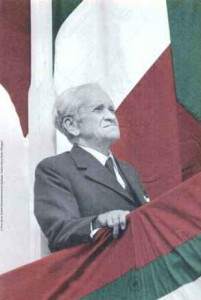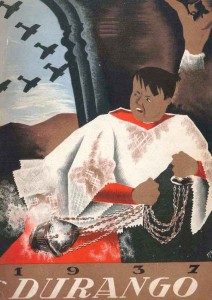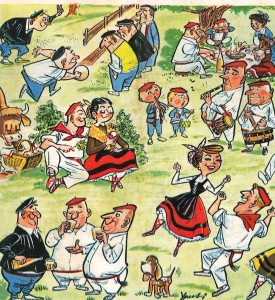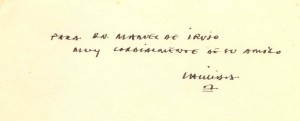The 2014-15 academic session will see the introduction of a Basque language, literature and popular culture module to the School of Cultures, Languages and Area Studies. The library of Manuel Irujo, the Navarrese lawyer and politician, donated by his family, has been fully catalogued and is available for study and research in Special Collections and Archives.

Manuel de Irujo Ollo was born in Estella / Lizarra in 1891. His father had close links with Sabino Arana Goiri, founder of the Basque Nationalist Party (the PNV); and the family had a long history of involvement in local politics. At Deusto University in Bilbao Irujo studied Humanities, but after the sudden death of his father retrained as a lawyer in order to take over his father’s practice. In 1919 Irujo was elected as a delegate to the Council of Navarra. Conservative forces conspired to annul the results and he was unable to take up his seat; he stood again in 1921 and served until 1931.In the national elections of 1931,1933 and 1936 Irujo was elected Member of Parliament for the Basque province of Gipuzkoa as a member of the Basque Nationalist Party, Partido Nacionalista Vasco (PNV). He supported the Second Spanish Republic and was fiercely opposed to Franco’s military uprising. He was appointed Minister Without Portfolio in 1936 in the Government of Largo Caballero and later became Minister of Justice under Negrin. Irujo was determined to restore a basic form of justice in the Spanish Republican Zone, but eventually he was forced to resign the position, mainly due to the extra judicial killings, which continued despite all his efforts. During the months he served as Minister Irujo saved the lives of many condemned to execution by firing squad and worked tirelessly to facilitate the exchange of prisoners and the safe passage of third parties.

After the Civil War Manuel Irujo initially went into exile in the United Kingdom. Later he served as a member of the Republican Government in exile in Mexico and went on to work with the Basque Government in exile in Paris under José Antonio Aguirre.Irujo was the author of a number of books including Inglaterra y los Vascos, in which he described the link between the Basque Country and Great Britain, and Instituciones juridicias, where he wrote about the Basque judicial system. Over the decades he wrote hundreds of articles for a number of periodicals including Euzko Deya : La Voz de los Vascos en México, Euzko Deya : La Voz de Euzkadi and Eusko-Gaztedi.
Irujo’s work in promoting European Unity earned him the title Honorary President of the Federal Peninsular Council of the European Movement (see Europa de los pueblos) and in October 1974 he was made Amigo de Europa. He returned to the Basque Country after Franco’s death, and was elected Senador to the Cortes in 1978, in which he served until his death in 1981.

The Manuel Irujo collection was donated to the Special Collections & Archives section of the Sydney Jones Library by Manuel Irujo’s grandchildren (Ane Button Irujo and Miren Button Irujo), and contains nearly 400 books and pamphlets and 117 periodicals, on Basque culture, the Spanish Civil War, with a section on Manuel Irujo’s legacy. Mostly collected by Irujo after he went into exile in the UK and France, the collection includes copies of Basque newspapers published for exiled communities who had relocated to Europe and the Americas. Many of the books are inscribed with dedications from Irujo’s friends, colleagues and associates, including the anti-Franco journalist and historian, Herbert Rutledge Southworth, the sculptor, Eduardo Chillida, the opera singer and writer, Isidoro de Fagoaga, the archaeologist and anthropologist, Pere Bosch-Gimpera, and the artist and politician Luis Quintanilla.
